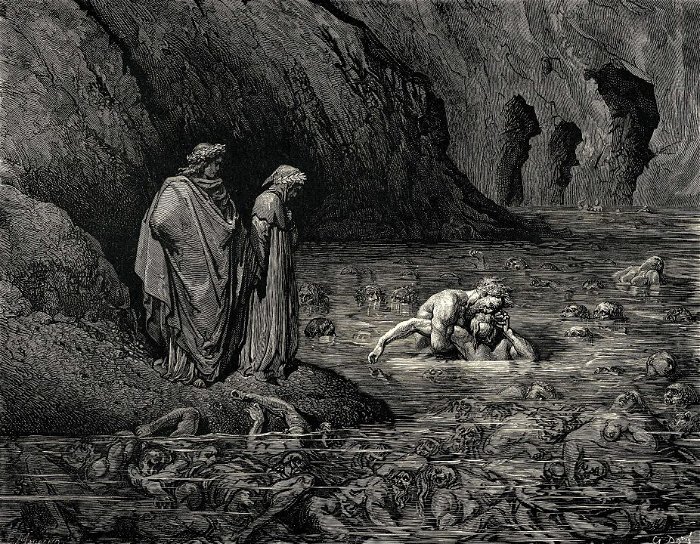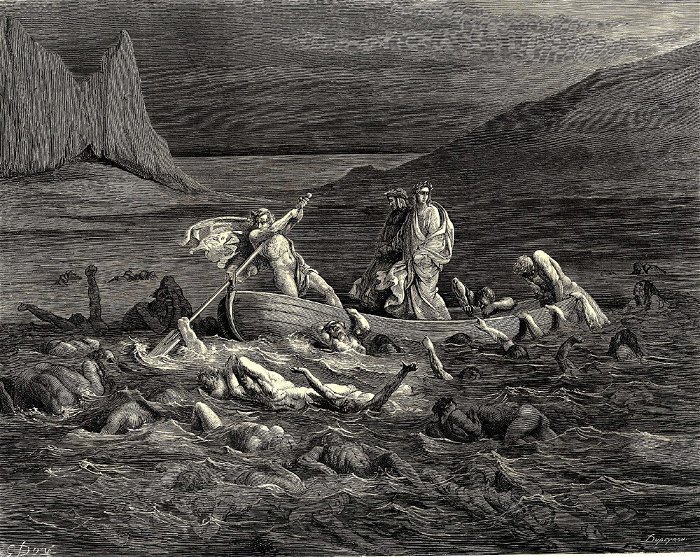Adapting Dante Alighieri’s Inferno isn’t the greatest idea. So much of what makes the 14th century poem resound is its language, whose strengths can’t be easily replicated with audiovisual media like film or videogames. Still, this didn’t stop Visceral Games from trying with the 2010 release of Dante’s Inferno, an action-adventure romp through hell that takes as many cues from Dante’s epic poem as it does brutal beat ‘em ups like God of War.

Visceral’s Inferno tries to recognize its source material in a fairly shallow way without properly engaging with its meaning. As fun as the game is to play through (and it is: this came as a bit of a surprise, probably because I wasn’t expecting much) it’s also related to the poetry it’s based upon only on a surface level. Though there’s a clear reverence for the source material evident in the developer’s work, the basic problem is that an action videogame isn’t the best venue for an adaptation of Inferno. Aside from the weird historical changes—in Visceral’s take, Dante Alighierei goes on a Crusade he wasn’t alive for and is married to his famous love Beatrice, who he actually only admired from afar and was never intimately involved with—the game shows that its writers and visual designers have obviously pored over Dante’s poetry.
There’s evidence of this throughout the entire campaign. In one level, a constant whirlwind is featured within the circle of hell devoted to lust as a literal translation of the whipping winds found in the poem; characters and punishments encountered in the ten ditches (malebolge) found in hell’s eighth circle are represented through statues in the game’s version; the sporadic dialogue sequences between Dante and Virgil typically found before save points, in which the latter explains the inferno to the former, are spoken versions of some of the poem’s conversations. Visceral definitely can’t be accused of laziness in their work—just missing the point.
Still, trying to imagine what a good videogame adaptation of Dante’s Inferno would look like presents an interesting thought experiment. How would a savvy developer translate the strengths of the epic poem to a medium as different from the original text as an interactive game? Visceral’s Dante’s Inferno shows that the story of The Divine Comedy certainly isn’t suited to an action title. Despite its success in making the basic story accessible to a different audience, the point of the poem—which sees Dante observing and talking about horrific violence, not taking part in it—is lost. If some elements of the basic structure of Visceral’s game were tossed to the side, like the re-casting of Dante as warrior, Beatrice as damsel in distress, and silly, overly “game-y” upgrades like “Beatrice Stones” (which allow Dante to “auto-absolve the Damned,” naturally), there could be the outline for a better adaptation. One that captures some of what has allowed Dante Alighieri’s work to survive for centuries.


Rather than square off against a version of Cerberus with a set of three giant mouths extended on stalks by ripping each of its heads off, an approach could be taken that celebrates the source material while still offering entertaining gameplay. In the poem, Virgil, Dante’s guide, knows that the gluttonous hunger Cerberus feels can be used to the two poets’ advantage. He flings mud at Cerberus’ three mouths so that the beast, previously ready to attack, becomes mindlessly consumed with eating. Because the creature is characterized by a ravenous appetite, Virgil is able to use this to his and Dante’s advantage. Many of the pair’s encounters with demons take this same shape: Virgil goads a giant into helping them progress on their journey by playing on his sense of pride, while Dante tricks a soul into sharing its life story by outwitting it with wordplay.

A direct replication of these moments wouldn’t make for the most difficult puzzles, but, still, they seem pretty appropriate for an adventure game. This genre, characterized as it is by long conversations, inner monologues, and thorough environmental exploration, would fit Dante’s Inferno more than perhaps any other genre. Rather than violently encounter demons and lost souls, Dante and Virgil would be able to engage in dialogue or solve puzzles related to them in an adaptation. The incredible descriptions that fill so many of Inferno’s verses could be offered alongside backdrops that interpret the scenery of hell visually.
There’s real value in finding ways to make classic literature more accessible to audiences. The possibility of helping to spark interest in centuries-old writing makes the idea of videogame adaptations worthwhile. Visceral’s attempt to do so with Dante’s Inferno was only marginally successful, but that doesn’t mean its efforts should be entirely dismissed. Instead, we could hope for other developers to take note of what did and didn’t work in the past and, by internalizing these lessons, take a better considered stab at a valuable project.




